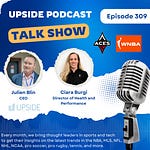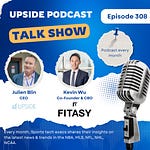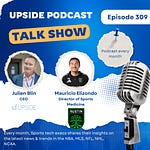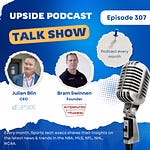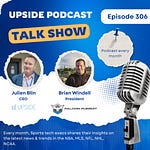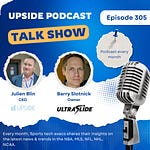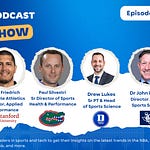
This week we had the honor to interview Dr. Ron Dick, associate professor of sports marketing at Duquesne University in the school of business. Ron also worked for 20 years in sports, including 15 years in the NBA with the Sixers and the Nets, and then four years in the NCAA.
📝Show Notes: Throughout our conversation, we touched on his background, his view on the COVID-19 crisis, but also what teams and leagues should do to offset losses in ticket sales and sponsorship. And we talked about the financial impact of the COVID-19 on the sports industry.
🚀Best Quotes: Here’s some of the key discussion points and best quotes from our conversation with Ron:
On how he started his career in pro sports: “In 1982, I was playing baseball at St. Joe's University, and at the end of that year, I was a sophomore. I wrote four letters to the major teams, the Phillies, the Flyers, the Sixers, the Eagles, requesting an internship. I got three thanks, but no thanks, except for the 76ers. So that was the year we won the championship in '82-'83, and I was an intern that year, and then also a part time employee in the second semester I went down Broad Street and got a championship ring. It was a fabulous experience at 21 years old. And then when I graduated in '84, they created a position and I was the director of group sales the last nine years from '87 to '96, and then the team was sold and I went to the closest NBA team, which was at the time the New Jersey Nets as director of ticket sales. That happened to be John Calipari's first year there. And it was interesting to see what the Sixers did better than the Nets, and what the Nets did better than the Sixers and compare two different NBA franchises in the area of sales and marketing".
On how the COVID-19 crisis compares to other events (strikes, lockouts..): “There's a fundamental difference between a lockout and a strike. The fans, we just hear, "Oh, work's stopping, work stoppage. I don't get to watch my favorite team play, and that's a problem." But if we do a little bit of a deeper dive on that, a strike is when the players say, "We're not happy with our contract" or "We don't have a contract. We are not going to play." Now, that happened in baseball on August 12th of '94, and we did not have a world series in the fall classic of '94. A work stoppage, the lockout, is when the owners lock the doors and say, "Players, you're not allowed in to the facilities. You're not allowed into the practice facilities and not allowed into the arenas. We are suspending business. We are not playing." That happened in the NHL. They didn't have a season the whole season, which was '04-'05. NBA, in the fall of '98, we only had a 50 game schedule that year, '98-'99. And the Spurs won the championship that year, and some people think it's tainted because it was not an 82 game schedule. I'm not one of those people. I think they earned their championship in a shortened 50 game schedule. So in those situations, it was negotiations between the owners, the league office and the players union. This situation is very unique in that the players are at risk”.
On his view on TV rights moving forward: “I think we should expect the TV revenues to be even stronger than normal, and I base that on the NFL draft where the ratings were through the roof, and I give kudos to the NFL for the way they ran that whole thing and sent the packages out with the cameras. They did it very nicely, and they followed the WNBA model on a little bit of a lesser scale of Nielsen ratings, but it worked. Now will we one day do that for the NHL and the NBA draft and the baseball draft? Yes, I think they will. When, I don't know. I think the NBA draft's still a go. So TV ratings should be high. I just think that you recoup the finances you can. You can't cry over spilled milk. You've just got to accept the fact that TV revenue is not going to be there. If the players can take a little bit of a reduction this is where the argument comes in, and the group that's really in trouble is the MLB, major league baseball, because the players have an extremely strong union with no salary cap, and they're asking players that are going to make upwards to $40M this year to take a severe pay cut”.
On his view on the minor league baseball: “Into the MLB minor leagues, first of all, independent baseball is really in trouble. I don't know if they will survive this, because those sports, those leagues, are always based on ticket revenue and the signage in the building, the people that are in the stands watching the signage, right? There's the signage for TV. Well, we can recoup that, because millions of people are watching on TV at the highest level of sports, but there may be only 60,000 people there for a football game, where minor league baseball, there might be 3,000 people there. There might be 2,000 people there. Well, if we don't have that revenue from the ticket sales, which then means makes the sponsorship worthless, because there is no TV, very little TV money and no radio money, then they won't make it”.
On the impact of COVID-19 on sports leagues: “The fans, and some of the retired players in the MLB, have spoken up and they've said, "Listen, there are people right now that have lost their job, and they are filing for unemployment, and right now it's billionaires arguing with millionaires, and the guy that just lost his job doesn't want to hear that someone that makes $7M to pitch baseballs and that a billionaire wants to cut his salary to $3.5M." Down in Tampa Bay, the average person doesn't want to hear about him complaining about that”.
On the impact on the NCAA: “Sports does carry into college, especially at the five major conferences, the SEC, Big 10, the Big 12, the ACC, the PAC 12, so the question is: Are they going to play? And some schools can, and some schools can't. And how does that affect the conference? The AAC is a pretty good athletic conference. It's newer, but they have nine states represented in their conference. So the states and the universities that are in the center of the country are kind of like, "Hey, let's go. We think we're okay. This thing is not the same problem that you have in Boston, New York, Philadelphia, Baltimore, DC in particular, or in California, on the coasts, where the majority of the people live." And what are we going to do about that? So the commissioners are scrambling. The athletic directors are scrambling. The presidents are scrambling, and who would want to be the president that would send students back into the dorms, and then God forbid something happens to one of the students. It's complicated”.
On what owners need to do to mitigate the COVID-19 crisis: “Everybody's got to chip in. Max Scherzer with the MLB, with the world champion Washington Nationals, he was very outspoken that there's no reason for us to talk anymore to the owners and to the teams if this is going to be their attitude. They really want the players to share in the decrease in salaries. They want a significant decrease after they're backing away from their original proposal, which seemed more acceptable. Again, for the common person, it's hard for them and us to understand billionaires arguing with millionaires, but I think the owners, it's easy for me to say, because it's not my money, but they should bite the bullet, pay the players their salaries or something fair, a percentage of their salary. Look, my Los Angeles Dodgers are worth more than $2 billion. That's what the team sold for eight years ago or so. You're going to get yours. Take a little bit of a hit now. You know you're going to continue to go up. I think it's on the owners to take a little bit of a hit right now. The players' window is limited on how many years they can play, and if they do that, we can get the teams up and playing and getting something for people to watch on TV, I think that they'll be pleasantly surprised how much they make off the ratings of the television”.
On the impact that COVID-19 could have in the fall on US college campuses: “I think a lot of eyes and ears are going to be on Notre Dame, August 10th. And you say, well, what's that? Notre Dame's model is they're going to start early on August 10th. They're going to play their sports, and they're going to be closed for business at the end of the semester by Thanksgiving. They'll do their final exams online, and then they won't reopen probably until the middle of end of January in case there was a second wave of this virus. (..) We're supposed to open on face to face two weeks later on the 24th, so if we see this spread like wildfire through a college campus, I think we'll all pump the brakes and go online, and that changes the whole dynamics of higher education if it's online versus face to face but we can control our student as far as the classroom (..) But we saw what happened in March. The minute we closed down our college campuses, so many young people thought it was like an extended spring break and they went down to Florida, and then we had to use one of the Jenner girls to put out a public service announcement as an influencer and say, "Hey gang, you got to stop doing that." We saw it spread like wildfire when they went down to the beaches of Florida and started partying. So that's a real concern for us, dealing with younger people who think they're invincible”.



